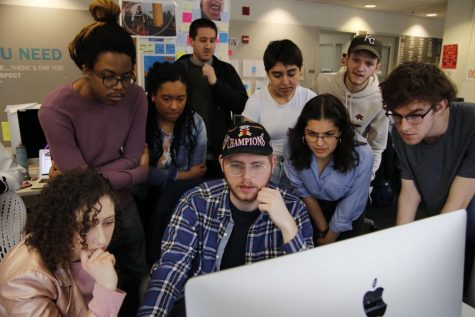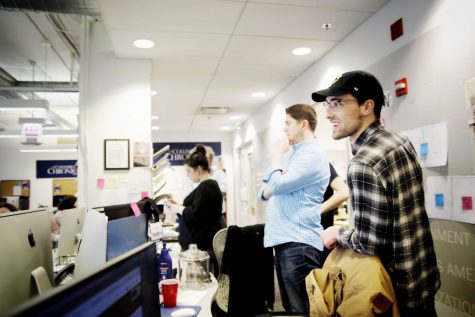Editor’s Note: The Chronicle will not stop reporting, no matter the ups and downs
March 26, 2020

Chronicle staffers read President and CEO Kwang-Wu Kim’s email announcing classes will be transitioned online, Thursday, March 12.
Wisconsin. Maryland. Hawaii. These are just a few of the places Chronicle staffers will be working from in the coming weeks as the college reckons with our country’s national emergency, one of the biggest obstacles it has ever faced.
The day the news broke of classes moving online, I was sitting in a history class on the Middle East. In between learning about Arab nationalism and the Sinai Peninsula, I glanced down at my phone and stepped out into the hallway to call Managing Editor Mari Devereaux to rattle off questions we needed to ask administrators in an interview the next day; I texted Managing Editor Kendall Polidori to make sure reporters were springing into action in the newsroom two blocks away, which they were.
When my class finished—just minutes after the official announcement was sent—I grabbed my coat and ran to the elevator. Speeding down the street and around the corner, I saw waves of Chronicle reporters and photojournalists heading out on a mission to get reaction interviews for the inevitable breaking news story.
Inside the newsroom, there was a quiet intensity as reporters gathered interviews, editors began to craft the article and photojournalists ran in and out the office. We all knew what we had to do. There was no need in saying it at that point; it was just a matter of figuring out how we were going to do it.
When the articles did start to be published, the feedback was mixed. On one hand, we had faculty telling us we were inaccurate. On the other hand, we had other faculty members and students telling us that we clarified everything. Going back to our sources, we confirmed that all our reporting was accurate; there was just a great sense of confusion and misunderstanding that commonly accompanies high-stake, complicated situations such as this.
Looking back, I don’t think the enormity of the situation had really dawned on me. We had been weighing the possibility of having to work remotely if the campus closed for days, but—like many other young people in my generation—I underestimated how much life would change as the world, the country, the state, the city and the college grappled with a pandemic.

(From left) Editor-in-Chief Alexandra Yetter, Managing Editor Mari Devereaux and Managing Editor Kendall Polidori edit a breaking news piece on the suspension of courses due to the coronavirus, Thursday, March 12.
When we did realize it—that our staff may not be together again in the newsroom until the summer or fall and that photojournalists would not be able to go out and photograph the news on campus—it was difficult to accept. When I, myself, fully realized this after it was made clear that classes would be online for the rest of the semester, I melted down. While on FaceTime with my father, I burst into tears at the final realization that I would not be able to take part in journalism in the way I truly wanted to.
Columbia and its students are unique in many ways. Up until now, I had thought those ways related to an ability to hustle while looking trendy as they walked down the street, being instantly recognizable as a Columbia student.
After recent events, I know that what really makes Columbia unique is that it gives thousands of students who grew up desperately wanting to spend every day of their lives working on their craft an outlet to do so. Growing up, I didn’t really have a way to express myself through journalism, other than reading it and watching films about history-changing reporters. Columbia provided a way for me to think about and act upon that desire 24 hours a day, seven days a week.
I’m not alone in this, either. Other Chronicle staffers have expressed their melancholy of not being able to photograph, design a page or cover the kinds of stories they want to because of this pandemic.
So, if anything, this ordeal has given me a newfound appreciation for what Columbia provides. But it has also fortified my most closely-held belief: the importance of journalism.

(From left) Editor-in-Chief Alexandra Yetter, General Manager Travis Truitt and Director of Photography Mike Rundle in the Chronicle’s newsroom on the staff’s second-to-last day in the office before campus was closed due to the coronavirus pandemic.
As our staff wondered what class suspensions meant for their Chronicle careers, I reassured them that we would all continue to work remotely, but in an email to the staff, I also reminded them of our editorial responsibility:
“In times like this, journalism is more important than ever. With so much anxiety and confusion, it’s important to tap into our responsibilities and morality as journalists by being hungry to report on different stories in a timely fashion. The editors do not take this responsibility lightly, and we hope the reporters and photojournalists do not take it lightly, either. … Times like these are what we have spent our entire journalistic educational careers preparing for. If you can do your part to help us inform our readers, that will be invaluable.”
Saying it to our reporters and photojournalists is one thing, it’s another to feel it.
I’ve reported on everything from sexual harassment to racism and sexism to job loss. None of them have hit me as hard as reporting on the story “‘I don’t feel like I have a home anymore’: Students scramble after dorms close.” As I listened to interviews of Columbia students, some of whom were balancing on the edge of crying, I couldn’t help but get emotional as I heard how much the dorms and campus closing affected them, their families and their artistic stability.
These students are the reason why the Chronicle will continue to do what it has always done—report.
Moving forward for the remainder of the semester, the Chronicle will be digital-only. We encourage you to subscribe to our newsletter, send us tips and letters to the editor and follow us on social media to stay up-to-date on the latest news. With spring break beginning Monday, March 30, we may post content a little less frequently for a few days but our staff remains hard at work to serve you, our readers.







